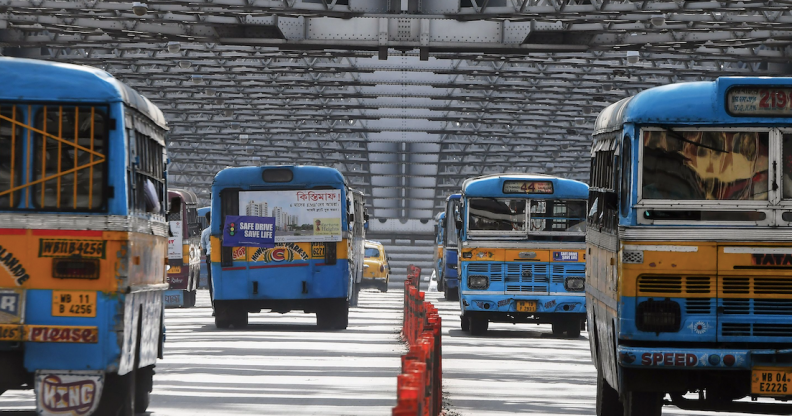Bus operator launches pioneering new scheme to encourage ‘awareness and respect’ for trans passengers

As many as 40,000 buses in India could soon have reserved seats for trans people (DIBYANGSHU SARKAR/AFP/Getty)
A private bus operators’ association in India has announced it will reserve two seats on every bus specially for trans passengers.
The seats marked “Tridhara,” meaning third power, will soon be seen on the 35,000-40,000 buses owned by the Joint Council of Bus Syndicates in West Bengal.
The practice has already begun on several routes, with the intention of normalising transgender people and encouraging respect for them.
“It is not just about earmarking two seats but to recognise transgender people and create awareness among commuters to treat them as equals,” said the council’s general secretary Tapan Banerjee, as reported by the New Indian Express.
“This will also sensitise the staff of the buses as well as passengers to treat people from the third gender with respect.”
He urged the state transport undertakings and other private operators to join the syndicate in the endeavour.
In a similar move in June, the Delhi metro dedicated its Sector 50 station to transgender people and renamed it “rainbow station”.
The train operator also offered a number of employment opportunities to transgender people to “pave the way for their healthy inclusion and participation in the society”.
Trans people have gained limited acceptance in India
Commonly known as “hijras”, transgender women play an important traditional role in India by providing an auspicious presence at births and weddings.
In 2014 they were legally recognised as a “third gender” and allowed to identify themselves as such in official documents.
However, their visibility doesn’t necessarily grant them acceptance. Discrimination is still widespread and hijras remain among the most marginalised people in Indian society, often forced to rely upon sex work and begging.
Moves towards greater acceptance have often ignored the very people they are designed to protect, as was the case in 2019 when a “dehumanising” trans rights bill was passed in spite of protests from a large number of gender-diverse groups.
The bill was hailed as “wholesome and comprehensive” by lawmakers but condemned by the transgender community itself, who fear it does more to infringe their rights than protect them.

